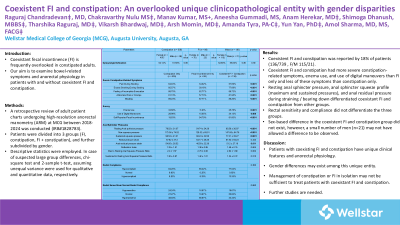Monday Poster Session
Category: Functional Bowel Disease
P2352 - Coexistent FecaI Incontinence and Constipation: Examination of Clinical and Physiological Features
Monday, October 28, 2024
10:30 AM - 4:00 PM ET
Location: Exhibit Hall E

Has Audio

Raguraj Chandradevan, MBBS
Medical College of Georgia at Augusta University
Augusta, GA
Presenting Author(s)
Raguraj Chandradevan, MBBS1, Chakravarthy Nulu, MS1, Manav Kumar, BS2, Aneesha Gummadi, MS3, Anam Herekar, MD3, Dhanush Shimoga, MBBS1, Tharshika Raguraj, MD3, Vikarsh Bhardwaj, MBBS4, Arsh Momin, MD5, Amanda Tyra, MS1, Yun Yan, MD1, Amol Sharma, MS, MD, FACG1
1Medical College of Georgia at Augusta University, Augusta, GA; 2Nova Southeastern University, Davie, FL; 3Augusta University, Augusta, GA; 4Jawaharlal Nehru Medical College, New Dehli, Delhi, India; 5Penn State Health Milton S. Hershey Medical Center, Atlanta, GA
Introduction: Fecal incontinence (FI) and constipation are often considered separately. Coexistent FI and constipation is under-recognized & presents challenges. Our aim is better understanding the clinical & physiological characteristics of this cohort.
Methods: A retrospective review of adult patients undergoing anorectal function tests (ArFT) at MCG between 2018-2024 was conducted (IRB1828783). Patients were divided by 3 groups (FI, constipation, FI + constipation) complied with Rome IV criteria for FI and constipation and subdivided by gender. Descriptive statistics was used. In case of suspected large group differences, chi-square test and 2-sample t-test assuming unequal variance were used for qualitative and quantitative data, respectively.
Results: Eighteen percent of patients (136/739) had coexistent FI and constipation (M/F 115/21). Concordant ArFT findings for dyssynergic defecation (abnormal BET & Manometric dyssynergia) was slightly higher in women (F/M 54%/51%) with constipation, however coexistent FI and constipation had male predominance with (M/F 55%/52%). Fifty-six percent of women with coexistent FI and constipation reported pain with defecation and more than 80% reported excess straining during stooling, feeling of incomplete evacuation, abdominal pain and bloating. All of this symptom profile in women were reported more common than FI group and less common than constipation group (p< 0.001). Resting anal sphincter pressure, max squeeze pressure, sustained squeeze pressure and anal residual pressure strain of coexistent FI and constipation group in women were significantly higher than FI group and significantly lower than constipation group (p< 0.001). In males, abdominal pain and pain during stooling were reported significantly in coexistent FI and constipation group (p< 0.05) and resting anal sphincter pressure, max squeeze pressure and sustained squeeze pressure of the coexistent FI and constipation group were significantly higher than FI group and significantly lower than constipation group. Higher frequency of digital maneuvers was reported in women in coexistent FI and constipation group (p< 0.05). No significant difference noted in between rectal compliance and sensitivity among all three groups.
Discussion: Patients with coexisting FI and constipation has a unique clinical & anorectal physiology. It is also recognized that gender differences exist among this unique entity. Management of constipation or FI alone may not be sufficient to help these patients’ symptoms profile.
Note: The table for this abstract can be viewed in the ePoster Gallery section of the ACG 2024 ePoster Site or in The American Journal of Gastroenterology's abstract supplement issue, both of which will be available starting October 27, 2024.
Disclosures:
Raguraj Chandradevan, MBBS1, Chakravarthy Nulu, MS1, Manav Kumar, BS2, Aneesha Gummadi, MS3, Anam Herekar, MD3, Dhanush Shimoga, MBBS1, Tharshika Raguraj, MD3, Vikarsh Bhardwaj, MBBS4, Arsh Momin, MD5, Amanda Tyra, MS1, Yun Yan, MD1, Amol Sharma, MS, MD, FACG1. P2352 - Coexistent FecaI Incontinence and Constipation: Examination of Clinical and Physiological Features, ACG 2024 Annual Scientific Meeting Abstracts. Philadelphia, PA: American College of Gastroenterology.
1Medical College of Georgia at Augusta University, Augusta, GA; 2Nova Southeastern University, Davie, FL; 3Augusta University, Augusta, GA; 4Jawaharlal Nehru Medical College, New Dehli, Delhi, India; 5Penn State Health Milton S. Hershey Medical Center, Atlanta, GA
Introduction: Fecal incontinence (FI) and constipation are often considered separately. Coexistent FI and constipation is under-recognized & presents challenges. Our aim is better understanding the clinical & physiological characteristics of this cohort.
Methods: A retrospective review of adult patients undergoing anorectal function tests (ArFT) at MCG between 2018-2024 was conducted (IRB1828783). Patients were divided by 3 groups (FI, constipation, FI + constipation) complied with Rome IV criteria for FI and constipation and subdivided by gender. Descriptive statistics was used. In case of suspected large group differences, chi-square test and 2-sample t-test assuming unequal variance were used for qualitative and quantitative data, respectively.
Results: Eighteen percent of patients (136/739) had coexistent FI and constipation (M/F 115/21). Concordant ArFT findings for dyssynergic defecation (abnormal BET & Manometric dyssynergia) was slightly higher in women (F/M 54%/51%) with constipation, however coexistent FI and constipation had male predominance with (M/F 55%/52%). Fifty-six percent of women with coexistent FI and constipation reported pain with defecation and more than 80% reported excess straining during stooling, feeling of incomplete evacuation, abdominal pain and bloating. All of this symptom profile in women were reported more common than FI group and less common than constipation group (p< 0.001). Resting anal sphincter pressure, max squeeze pressure, sustained squeeze pressure and anal residual pressure strain of coexistent FI and constipation group in women were significantly higher than FI group and significantly lower than constipation group (p< 0.001). In males, abdominal pain and pain during stooling were reported significantly in coexistent FI and constipation group (p< 0.05) and resting anal sphincter pressure, max squeeze pressure and sustained squeeze pressure of the coexistent FI and constipation group were significantly higher than FI group and significantly lower than constipation group. Higher frequency of digital maneuvers was reported in women in coexistent FI and constipation group (p< 0.05). No significant difference noted in between rectal compliance and sensitivity among all three groups.
Discussion: Patients with coexisting FI and constipation has a unique clinical & anorectal physiology. It is also recognized that gender differences exist among this unique entity. Management of constipation or FI alone may not be sufficient to help these patients’ symptoms profile.
Note: The table for this abstract can be viewed in the ePoster Gallery section of the ACG 2024 ePoster Site or in The American Journal of Gastroenterology's abstract supplement issue, both of which will be available starting October 27, 2024.
Disclosures:
Raguraj Chandradevan indicated no relevant financial relationships.
Chakravarthy Nulu indicated no relevant financial relationships.
Manav Kumar indicated no relevant financial relationships.
Aneesha Gummadi indicated no relevant financial relationships.
Anam Herekar indicated no relevant financial relationships.
Dhanush Shimoga indicated no relevant financial relationships.
Tharshika Raguraj indicated no relevant financial relationships.
Vikarsh Bhardwaj indicated no relevant financial relationships.
Arsh Momin indicated no relevant financial relationships.
Amanda Tyra indicated no relevant financial relationships.
Yun Yan indicated no relevant financial relationships.
Amol Sharma indicated no relevant financial relationships.
Raguraj Chandradevan, MBBS1, Chakravarthy Nulu, MS1, Manav Kumar, BS2, Aneesha Gummadi, MS3, Anam Herekar, MD3, Dhanush Shimoga, MBBS1, Tharshika Raguraj, MD3, Vikarsh Bhardwaj, MBBS4, Arsh Momin, MD5, Amanda Tyra, MS1, Yun Yan, MD1, Amol Sharma, MS, MD, FACG1. P2352 - Coexistent FecaI Incontinence and Constipation: Examination of Clinical and Physiological Features, ACG 2024 Annual Scientific Meeting Abstracts. Philadelphia, PA: American College of Gastroenterology.
